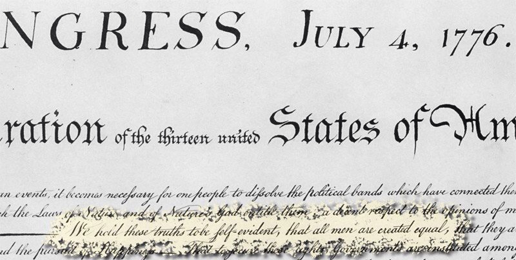
The New York Times has embarked on an effort to rewrite the history of the United States as a nation built upon slavery. Calling it the “1619 Project,” the opening article is a whopping 7,600-word effort to look at 18th Century history through a liberal 21stcentury lens. Joshua Lawson has written an excellent rebuttal to this effort in The Federalist. Because much of the NYT’s ideology is already being inserted into the narrative of schools and universities, I wanted to pass along some portions of this important article for your consideration.
No, America Wasn’t Built On Slavery, But Faith That All Men Are Created Equal
The year 1619 was chosen for the Times’ “re-founding” to mark when the first slaves arrived in the English settlement of Jamestown.
Slavery was a heart-wrenching, obstacle during America’s birth, but by no objective analysis was it the central factor of the founding as the 1619 Project claims.
Slavery was and is an abomination. It is an evil part of America’s past—as well as that of nearly every nation on earth. The fact that slavery has a universal heritage does not absolve American slave owners, but it does provide a necessary historical context.
During the 17th century, slavery was, sadly, an accepted part of life throughout the world. By A.D. 1619, slavery had existed for more than 5000 years, dating back at least to Mesopotamia.
Written by Nikole Hannah-Jones, the 7,600-word flagship essay of the 1619 Project asserts that “our democracy’s founding ideals were false when they were written.” Hannah-Jones claims, “white men who drafted those words did not believe them to be true for the hundreds of thousands of black people in their midst.” She provides no evidence or examples for this sweeping assertion.
Jefferson’s original final draft of the Declaration explicitly referred to black slaves not as property but as men. Letters written to John Jay show Alexander Hamilton hoping the Revolutionary War could lead to the emancipation of blacks and appraising them equal to whites in their abilities. Additional examples are plentiful.
The Founders were painfully aware of the cognitive dissonance of forming a nation under the proclamation that all were created equal while maintaining slavery. They also had to face the political reality that the 13 colonies could not be united in a new nation if they immediately abolished slavery.
With no other way to obtain the necessary support for unity and ratification, the Founders spitefully tolerated slavery’s existence, while also placing it on a path to extinction. Once the nation secured independence, American statesman of the Founding Era slashed away at slavery as quickly as prudence and political reality would allow.
The Northwest Ordinance of 1787 prohibited slavery in the territory that would become the states of Michigan, Ohio, Indiana, Illinois, and Wisconsin. In 1794, Congress barred American ships from engaging in the slave trade. Additional legislation in 1780 banned Americans from employment or investment in the international slave trade. Finally, the U.S. Congress officially banned the importation of slaves beginning on January 1, 1808, the earliest date allowed under the deal made to ratify the Constitution.
Far from the bastion of racism, hate and pro-slavery sentiment that the 1619 Project portrays, much of the United States was ahead of the world in ending the horror of slavery. Shortly after the signing of the Declaration, northern states took the lead. By 1804, New York, New Hampshire, Massachusetts, Vermont, Rhode Island, Connecticut, New Jersey, and Pennsylvania had passed laws that immediately or gradually abolished slavery.
If the American Founding was grounded in slavery, and the Founders didn’t believe a word of the opening of the Declaration, how does one account for these actions?
According to Hannah-Jones, one of the “primary reasons” Americans declared independence was to preserve slavery, fearful of the “growing calls” to abolish the slave trade in London. However, a closer look shows the abolitionist movement didn’t have a truly organized presence in England until 1783 when the first petition was filed by Quakers. It wasn’t until 1787 that the influential Society for Effecting the Abolition of the Slave Trade was founded.
The 1619 Project is politically driven 2020 posturing dressed in the veneer of a historical “exposé.” By warping history, it hopes that dopamine hits of anger and injustice will prevent readers from engaging in objective analysis. Just in time to paint America as racist for the upcoming presidential election.
Leftists are banking that the outrage caused by the 1619 Project will provide them the political capital required to move to the next stage: a full reconfiguration of America into their image.
America does not need further tribal rhetoric tearing up what little societal cohesion remains. The nation certainly doesn’t benefit from Times writers conducting a growing chorus of anger and grievance.
This article was originally published by AFA of Indiana.
































